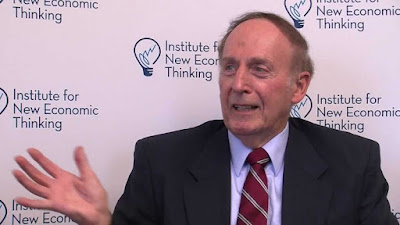Paper on Paul with Tom Palley and Jamie Galbraith published by ROKE. From the abstract:"Paul Davidson was a critical figure in the preservation of John Maynard Keynes’s ideas, sticking with them when they were out of fashion. He was also key to the survival of the Post Keynesian school. Davidson endorsed Keynes’s liquidity preference theory of interest, and he emphasized fundamental uncertainty as a central feature of economic reality, essential to making sense of a monetary economy. His greatest legacy is the Journal of Post Keynesian Economics, the intellectual home for a generation of Post Keynesian economists. Without his efforts, the heterodox economics community would be significantly smaller than it is now."Full paper available here.
Topics:
Matias Vernengo considers the following as important: Davidson, Galbraith, JPKE, Palley, Post Keynesian Economics, ROKE
This could be interesting, too:
Matias Vernengo writes More on the possibility and risks of a recession
Matias Vernengo writes Paul Davidson (1930-2024)
Matias Vernengo writes My short piece on Solow and his relation to the Review of Keynesian Economics
Matias Vernengo writes Keynes’ denial of conflict: a reply to Professor Heise’s critique
Paper on Paul with Tom Palley and Jamie Galbraith published by ROKE. From the abstract:
"Paul Davidson was a critical figure in the preservation of John Maynard Keynes’s ideas, sticking with them when they were out of fashion. He was also key to the survival of the Post Keynesian school. Davidson endorsed Keynes’s liquidity preference theory of interest, and he emphasized fundamental uncertainty as a central feature of economic reality, essential to making sense of a monetary economy. His greatest legacy is the Journal of Post Keynesian Economics, the intellectual home for a generation of Post Keynesian economists. Without his efforts, the heterodox economics community would be significantly smaller than it is now."
Full paper available here.

